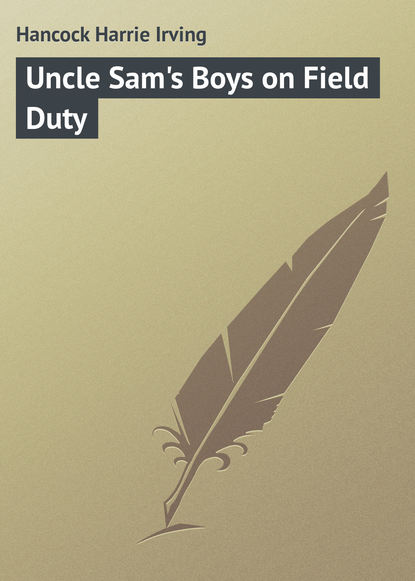По всем вопросам обращайтесь на: info@litportal.ru
(©) 2003-2024.
✖
Uncle Sam's Boys on Field Duty
Настройки чтения
Размер шрифта
Высота строк
Поля
"Fours right, march! By file, march!"
B Company again struck the trail, heading further up into the mountains, leaving the wagons to follow presently. Though B Company was now likely to be attacked at any time in sham battle, by C Company, it had been agreed that the respective wagon trains of the companies were to be immune from capture on this day.
"Overton, keep a distance of ten paces from the rear man of the company, and march before me," commanded Cotter. "Keep the step carefully until the order for route step comes."
Never in his life had Hal Overton felt as heart-sick as he did now.
Marching to the rear, a prisoner!
It was, in every sense, as bad as being in the guard-house.
Up ahead in the line things were "doing," but to this Hal, in his new misery, was all but blind.
Sergeant Hupner, with six men, had been sent ahead as a "point" to discover any possible enemy who might be lurking in the way of the forward progress of B Company.
Scouts had been sent out on either flank. The line moved slowly, as though fearing the presence of an actual enemy. There were frequent halts. At one time, while the line waited, Lieutenant Prescott took a detachment of twelve men to explore the country ahead. When he returned, reporting no enemy developed, B Company moved forward, though never without point and flankers.
At noon B Company, still having stirred up no enemy, halted for dinner.
Captain Cortland and his two young officers got through their meal with soldierly despatch. Then the company commander called to Sergeant Gray, who reported, saluting.
"Sergeant, direct Corporal Cotter to bring his prisoner here."
Seated on a small boulder, the captain eyed young Overton keenly as the latter was brought up.
"Private Overton," began Cortland, "have you yet discovered, or really suspected, how your rifle bolt came to be in such bad shape?"
"No, sir," replied Hal, again saluting.
"At first glance it looked like a case of sheer neglect on your part to care for your piece."
"Yes, sir."
"But those file marks?"
"I can't explain them, sir."
"It is forbidden for any man to use a file on the parts of his rifle, except by direct permission from one of the company officers."
"I know it, sir."
"Have you had any such permission?"
"No, sir."
"Have you a file?"
"Not a real one, sir. Only a manicure file."
"Let me see it."
Hal turned over the file, after finding it in his haversack.
"Now, let me have the bolt from your rifle."
Captain Cortland tried the file lightly in some of the nicks in the bolt. Then he passed file and bolt over to Lieutenant Hampton.
"Mr. Hampton, don't these nicks seem to fit this file remarkably well?" queried the company commander.
"They appear to – very well, sir," replied Lieutenant Hampton, testing the file in the nicks.
"What do you say, Mr. Prescott?"
The young second lieutenant studied file and bolt attentively.
"I am obliged to agree, Captain, with yourself and Mr. Hampton."
"Private Overton, think again. Do you still care to deny that you employed the file on the bolt of your rifle?"
"I deny it, sir, with all the emphasis of which I am capable," was Hal's earnest retort. His face was flushed, his breath came quickly, but he looked straight and honestly into his commander's eyes. There was no cringing in his attitude. His high color was to be attributed only to the humiliation of the position in which he found himself.
"And this bolt has been in the fire," continued Captain Cortland. "Just such a fire, let us say, as you build three times a day for the preparation of your food. The temper of the end of the bolt is ruined."
"Yes, sir. May I speak, Captain?"
"Go on, Overton."
"Captain Cortland, I am aware how badly this looks for me. But I assure you, sir, on my honor as a soldier, that I have no guilty or other knowledge of how the bolt came to be in this fearful condition. I am entirely innocent, sir, of any act that could have put the bolt in such condition."
"You are not guilty even of negligence, Overton?"
"Not of any intentional negligence, sir."
"Then, Overton, you must have some sort of suspicion of how this thing happened."
"I have a suspicion, Captain, but it is not founded on anything that is yet very tangible, sir."
"You think it an enemy's work?"
"Yes, sir. None but an enemy could do such a thing as this to a comrade's rifle."
"Granted, but who is the enemy?"
"May I be excused, sir, from answering?" asked Private Overton very respectfully.
"Why?"
"Because it is quite possible that, in naming an enemy, I may do some honest soldier an injury."











